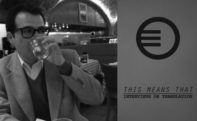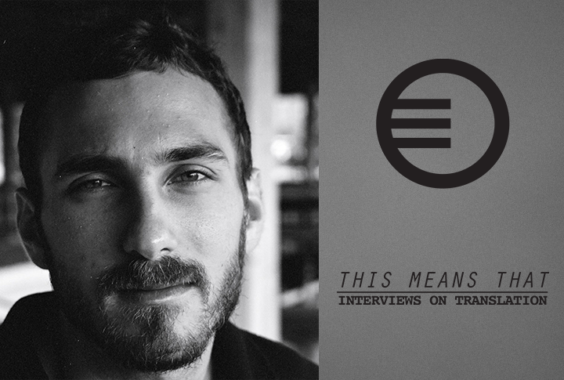
Por Interview by Brenda Lozano, Spanish to English Translation by Ana Isabel Martínez

Brenda Lozano: What book or story led you to English?
Ezequiel Zaidenwerg: I don’t remember. But there is an origin story that I like to repeat, and that’s related to English. My first literary revelation occurred while reading a translation of Mark Twain’s Huckleberry Finn: in my memory, during his escape on the Mississippi, Huck stopped in a neighboring town and bought a very long series of things (a bottle of whiskey, a knife, bacon, and various provisions) for just a dollar. I, who had some idea of the value of money, had the intuition that in that small miracle the strength of literature was encoded. Many years later, I read Huckleberry Finn in the original language, with the illusion of rediscovering that passage and recreating that feeling. Of course, I never found the episode again.
Tell us about your first translation.
I began translating poetry after I finished my first book. It was a kind of consolation prize during a creative dry spell when I couldn’t write poems. I admired the work of my friend Hernán Bravo Varela, whose translations seemed like poems originally written in the target language. We organized a get together with another friend, Alejandro Crotto, which coincided with a visit to Buenos Aires, to show each other what we were doing. As I had nothing new, I began frantically translating. From that first session of translation came versions of Pound, Beckett, William Carlos Williams and an adaptation of a monologue from Hamlet to lunfardo [a dialect from the region of Buenos Aires]. Then it occurred to me to create a blog to upload the translations. Strangely, it didn’t take long for people to start coming to the site, and they kept coming in large numbers. Today, zaidenwerg.com is on its way to celebrating its tenth anniversary.
Is translation a way to get closer or move away from the original text?
I believe in a kind of poetic Platonism, according to which poems exist as forms on a higher plane, unrelated to any linguistic incarnation. Thus, the “originals” would already be translations, created from the original form just like any other version. In all ways, I seek to approach that ideal form, although in doing so I move away from certain elements of the “original,” especially those that have to do with characteristics that are specific to each language.
How faithful are you to the original? How would you describe that fidelity, as being more literal, more conceptual?
Translation is that promised land in which one can be polyamorous without offending anyone. In my private life, I don’t accord a transcendent value to fidelity—although I do to loyalty. I guess the same goes for poetry.
Is there a metaphor, some lines or verses that depict your idea of translation?
Translating a poem is like playing a piano and using sheet music: there are written instructions, but also plenty of room for interpretation, both in hermeneutical and aesthetic terms.
Does translation exist only within the confines of language or are there other forms of translation whose materiality aren’t words?
I lack the intellectual strength necessary to answer that question.
¿Qué libro o qué historia te llevó al inglés?
No lo recuerdo. Pero hay una historia de iniciación que me gusta repetir, y que está relacionada con el inglés. Mi primera revelación de lo literario ocurrió mientras leía una traducción de Huckleberry Finn de Mark Twain: en mi recuerdo, durante su huida por el Mississippi, Huck se detenía en un pueblo vecino y compraba una larguísima serie de cosas (una botella de whisky, un cuchillo, tocino y provisiones varias) por apenas un dólar. Yo, que tenía cierta idea del valor del dinero, tuve la intuición de que en ese módico milagro se cifraba la fuerza de la literatura. Muchos años después, leí Huckleberry Finn en su lengua original, con la ilusión de reencontrarme con ese pasaje y recrear aquella sensación. Por supuesto, jamás volví a encontrar el episodio.
Háblanos de tu primera traducción.
Empecé a traducir poesía como una especie de premio de consolación en una época de esterilidad, luego de terminar mi primer libro, en que no podía escribir poemas. Admiraba el trabajo de mi amigo Hernán Bravo Varela, cuyas traducciones parecían poemas escritos originalmente en la lengua de destino. Coincidiendo con una visita suya a Buenos Aires, organizamos una tertulia con otro amigo, Alejandro Crotto, para mostrarnos lo que estábamos haciendo. Como yo no tenía nada nuevo, me puse a traducir frenéticamente. De esa primera sesión de traducción salieron versiones de Pound, Beckett, William Carlos Williams y una adaptación del monólogo de Hamlet al lunfardo. Luego se me ocurrió crear un blog para subir las traducciones. Extrañamente, las visitas no tardaron en llegar y continuaron visitándome en forma nutrida. Hoy zaidenwerg.com va en camino a su primera década de existencia.
¿Es la traducción una forma de acercarse o una forma de alejarse del texto original?
Creo en una especie de platonismo poético, según el cual los poemas existirían en tanto formas en un plano superior, desvinculados de cualquier encarnación lingüística. Así, los “originales” serían ya traducciones, que participarían de esa forma originaria tanto como cualquier otra versión. Busco, de todos modos, yo también acercarme a esa forma ideal, aunque al hacerlo me aleje de ciertas particularidades del “original”, sobre todo de aquellas que tienen que ver con accidentes específicos a cada lengua.
¿Qué tan fiel eres al original? ¿Cómo caracterizarías esa fidelidad, ¿más literal, más conceptual?
La traducción es esa tierra prometida en que se puede ser poliamoroso sin ofender a nadie. En mi vida privada, no le adjudico un valor trascendente a la fidelidad, sí a la lealtad. Supongo que lo mismo vale para la poesía.
¿Hay alguna metáfora, algunas frases o versos que retraten tu idea de la traducción?
Traducir un poema es como tocar una partitura en el piano: hay instrucciones escritas, pero también muchísimo espacio para la interpretación, tanto en términos hermenéuticos como estéticos.
¿La traducción sólo existe en los confines del lenguaje o hay otras formas de traducción cuyo material no sean las palabras?
Carezco de la fuerza intelectual necesaria para contestar esta pregunta.
Ezequiel Zaidenwerg was born in Buenos Aires in 1981. He has published Doxa (Vox, 2007), The lyric is dead (Vox, 2011), and Sinsentidos comunes (Bajolaluna, 2015), illustrated by Raquel Cané. He lives in New York.
Brenda Lozano was born in Mexico City. A narrator and essayist, she contributes to Letras Libres and Día Siete, among other publications. Her newest work, Como piensan las piedras, was released in 2017 by ALFAGUARA. She is the Spanish Language Editor for MAKE Magazine and Co-Director of the Lit & Luz Festival.
Kenneth Guay is from New York. He has an MA in English from Marquette University in Milwaukee and is currently the Assistant Managing Editor at MAKE Magazine.
Ezequiel Zaidenwerg nació en la Ciudad de Buenos Aires en 1981. Publicó Doxa (Vox, 2007), La lírica está muerta (Vox, 2011) y Sinsentidos comunes (Bajolaluna, 2015), ilustrado por Raquel Cané. Vive en Nueva York.
Brenda Lozano nació en la ciudad de México. Es narradora and ensayista. Colabora con Letras Libres y Día Siete, entre otras publicaciones. Su libro, Como piensan las piedras, fue publicado en 2017 por ALFAGUARA. Es editora para MAKE Magazine y también es Co-Directora del Lit & Luz Festival.
Kenneth Guay es de Nueva York. Tiene una Maestría en literatura de la Universidad de Marquette en Milwaukee y es Asistente del Editor Gerente de MAKE Magazine.















click to see who
MAKE Magazine Publisher MAKE Literary Productions Managing Editor Chamandeep Bains Assistant Managing Editor and Web Editor Kenneth Guay Fiction Editor Kamilah Foreman Nonfiction Editor Jessica Anne Poetry Editor Joel Craig Intercambio Poetry Editor Daniel Borzutzky Intercambio Prose Editor Brenda Lozano Latin American Art Portfolio Editor Alejandro Almanza Pereda Reviews Editor Mark Molloy Portfolio Art Editor Sarah Kramer Creative Director Joshua Hauth, Hauthwares Webmaster Johnathan Crawford Proofreader/Copy Editor Sarah Kramer Associate Fiction Editors LC Fiore, Jim Kourlas, Kerstin Schaars Contributing Editors Kyle Beachy, Steffi Drewes, Katie Geha, Kathleen Rooney Social Media Coordinator Jennifer De Poorter
MAKE Literary Productions, NFP Co-directors, Sarah Dodson and Joel Craig